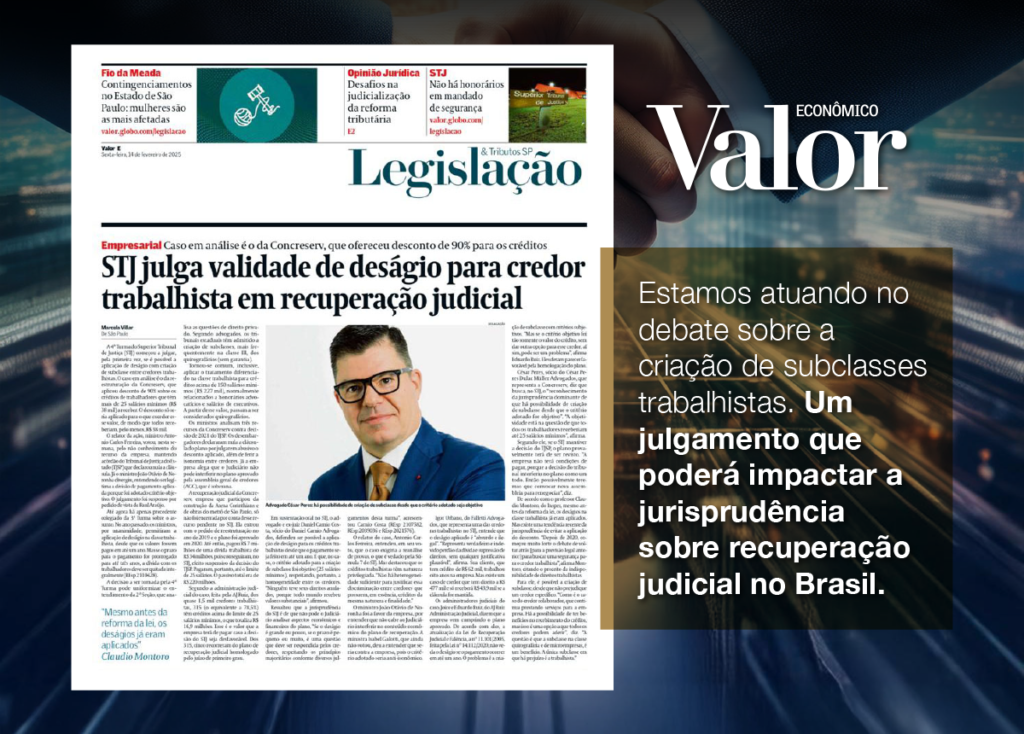No 3º Congresso Cerealista Brasileiro, contribuímos para ampliar o debate sobre as alternativas disponíveis aos credores diante do avanço da recuperação judicial no agronegócio. A apresentação conduzida por Thomas Dulac Müller, sócio-diretor da CPDMA, destacou os principais pontos de atenção para cerealistas e demais agentes da cadeia, com foco na organização coletiva, na atuação estratégica em […]
CPDMA BLOG
STJ and the Validity of the Discount for Labor Creditors: Our Role in the Concreserv Case

The Superior Court of Justice (STJ) has begun the trial of a crucial issue for business law and judicial recovery in Brazil: the possibility of applying a discount on labor claims and creating subclasses within this category. The case under review involves the judicial recovery of the company Concreserv, which established a 90% discount on amounts exceeding 25 minimum wages (R$ 38,000). This criterion was approved by the General Meeting of Creditors (AGC) but was later annulled by the São Paulo Court of Justice (TJSP) on the grounds that it violated the principle of equality.
Divergence in the STJ and Impacts on Jurisprudence
So far, there is disagreement among the STJ ministers regarding the validity of this type of discount. The case’s rapporteur, Minister Antonio Carlos Ferreira, voted to uphold the TJSP’s decision, arguing that all labor creditors have claims of the same nature and, therefore, there is no justification for differential treatment.
On the other hand, Minister João Otávio de Noronha dissented, arguing that the creation of subclasses can be legitimate when an objective criterion is adopted, as was the case with the 25 minimum wages. In his view, the decision of the AGC should be respected, and the Judiciary should not interfere with the economic content of the recovery plan. The trial was suspended following a request for review by Minister Raul Araújo.
Precedents and Trends in Jurisprudence
The 3rd Panel of the STJ has already analyzed a similar case and allowed the application of a discount on labor claims, provided that payment was made within one year. If the deadline was extended to up to three years, full payment was required. However, the 4th Panel, which is judging the Concreserv case, may establish a precedent that will serve as a basis for future decisions on the matter.
In state courts, the creation of subclasses is more common in Class III (unsecured creditors), but some judicial recoveries have been applying differentiated treatment in the labor class for claims exceeding 150 minimum wages (R$ 227,000). This practice has been challenged, especially when it involves attorney fees and executive salaries, since, above this amount, the claims are considered unsecured.
The Role of CPDMA in the Case
Our law firm, Cesar Peres Dulac Müller Advogados, represents Concreserv in this trial and advocates for the validity of creating subclasses, as long as objective criteria are applied. According to Cesar Augusto da Silva Peres, a partner at the firm, prevailing jurisprudence already recognizes this possibility:
“We seek, in the STJ, the recognition of the prevailing jurisprudence that allows the creation of subclasses, provided that the adopted criterion is objective. The objectivity lies in the fact that all workers would receive up to 25 minimum wages.”
He emphasizes that if the STJ upholds the TJSP’s decision, Concreserv’s recovery plan may require revision, which would impact the company's continuity and negotiations with creditors:
“The company will not be able to pay because the court’s decision interfered with the recovery plan as a whole. Therefore, we will likely have to call a new meeting to renegotiate.”
The outcome of this trial will be crucial for the legal certainty of judicial recovery processes in Brazil, especially in balancing the rights of creditors and the feasibility of restructuring financially distressed companies.
To read the full article published by Valor Econômico, click here.
Recent posts
The Tax Reform, provided for in the Federal Constitution (art. 156-A), in Complementary Bill No. 108/2024, and in Complementary Law No. 214/2025, had as its main goal to transform the consumption taxation system in Brazil. Five complex taxes were eliminated — PIS, Cofins, IPI, ICMS, and ISS — which will be replaced by […]
STJ upholds acquisition for any price in the 3rd round of the bankruptcy auction and rejects claims of an unfairly low price
A Terceira Turma do Superior Tribunal de Justiça (STJ) proferiu uma decisão de grande impacto no Direito Empresarial e Processual, validando a arrematação de um imóvel de massa falida por apenas 2% de sua avaliação. Esta decisão é fundamental e reforça a prioridade da Lei de Falências (Lei nº 11.101/2005, atualizada pela Lei nº 14.112/2020) […]
Em recente julgamento (REsp 2.180.611-DF), a Terceira Turma do STJ estabeleceu um entendimento crucial que visa proteger o patrimônio do coproprietário ou cônjuge, em caso de penhora e arrematação de bens indivisíveis, que não tem responsabilidade pela dívida (o alheio à execução). O que mudou e o que você precisa saber? A lei (Código de Processo Civil - […]
O Superior Tribunal de Justiça (STJ) firmou um importante entendimento no Tema Repetitivo 1368 sobre a taxa de juros de mora aplicável a dívidas de natureza civil no Brasil, antes da vigência da Lei n.º 14.905/2024. --- A tese firmada: o STJ estabeleceu que o artigo 406 do Código Civil de 2002 (em sua redação anterior à Lei […]
Rural sale-and-leaseback: liquidity for companies in crisis and protected returns for investors
No agronegócio brasileiro, a busca por capital rápido em meio à escalada dos juros fez crescer uma estrutura já conhecida no mercado imobiliário urbano: o sale-and-leaseback. A lógica é direta: o produtor vende a área rural a um investidor, recebe o dinheiro à vista e, no mesmo ato, assina um contrato de arrendamento a longo prazo […]


